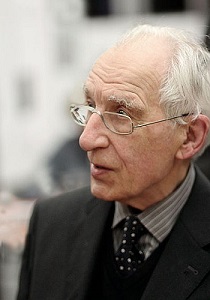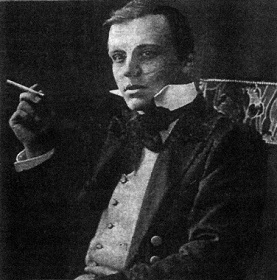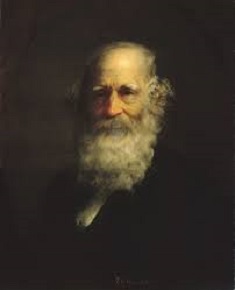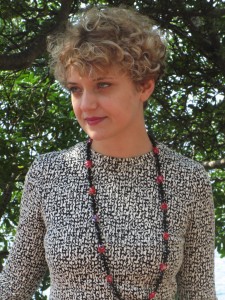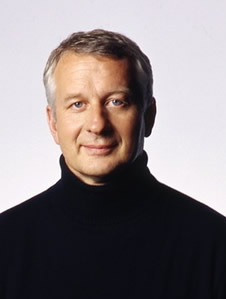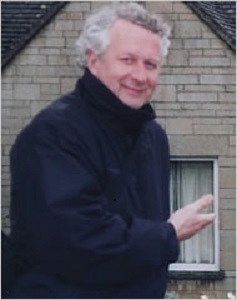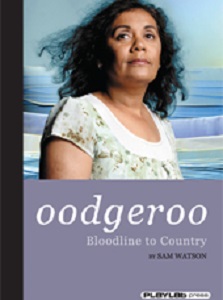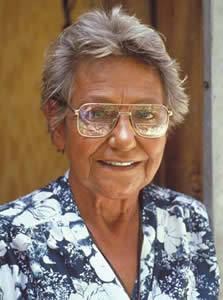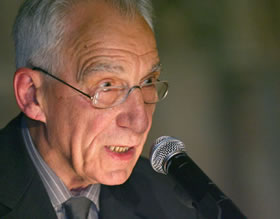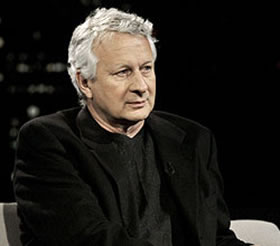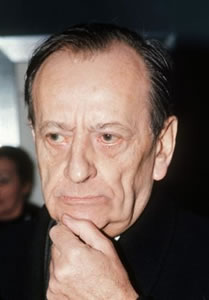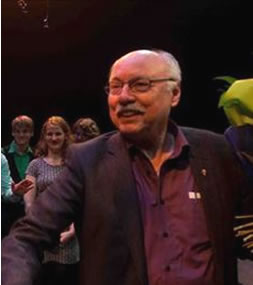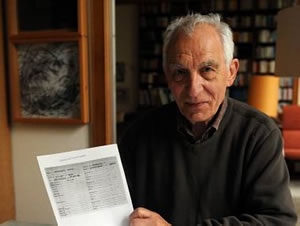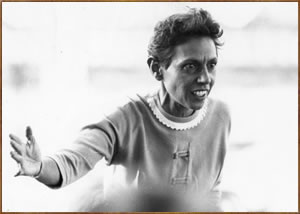De Franse schrijver en kunstfilosoof André Malraux werd geboren op 3 november 1901 in Parijs. Zie ook mijn blog van 3 november 2007 en ook mijn blog van 3 november 2006.
Uit: La liberté n’a pas toujours les mainspropres
« La liberté, mesdames, messieurs, n’a pas toujours les mainspropres; mais quand elle n’a pas les mains propres, avant de lapasser par la fenêtre, il faut y regarder à deux fois.Il s’agit d’un théâtre subventionné, dites-vous. Là-dessus, je n’airien à dire.Mais, la lecture qui a été faite à la tribune est celle d’un fragment1.Ce fragment n’est pas joué sur la scène mais dans les coulisses. Ildonne, dit-on, le sentiment qu’on est en face d’une pièce anti-française. Si nous étions vraiment en face d’une pièce antifrançaise,un problème assez sérieux se poserait. Or, quiconque a lu cettepièce sait très bien qu’elle n’est pas antifrançaise. Elle est anti-humaine. Elle est anti-tout.Genet n’est pas plus antifrançais que Goya anti-espagnol.Vousavez l’équivalent de la scène dont vous parlez dans les Caprices.Par conséquent, le véritable problème qui se pose ici – il a d’ailleursété posé – c’est celui, comme vous l’avez appelé de la «pourriture».Mais là encore, mesdames, messieurs, allons lentement ! Car avecdes citations on peut tout faire : « Alors, ô ma beauté, dites à lavermine qui vous mangera de baisers…», c’est de la pourriture!Une charogne, ce n’était pas un titre qui plaisait beaucoup auprocureur général, sans parler de Madame Bovary.Ce que vous appelez de la pourriture n’est pas un accident. C’est ce au nom de quoi on a toujours arrêté ceux qu’on arrêtait. Je neprétends nullement – je n’ai d’ailleurs pas à le prétendre – queM. Genet soit Baudelaire. S’il était Baudelaire, on ne le sauraitpas. la preuve c’est qu’on ne savait pas que Baudelaire était ungénie. (Rires.)Ce qui est certain, c’est que l’argument invoqué : «Cela blesse masensibilité, on doit donc l’interdire», est un argument déraisonnable.L’argument raisonnable est le suivant : «Cette pièce blesse votresensibilité. N’allez pas acheter votre place au contrôle. On joued’autres choses ailleurs. Il n’y a pas obligation. Nous ne sommespas à la radio ou à la télévision.»Si nous commençons à admettre le critère dont vous avez parlé,nous devons écarter la moitié de la peinture gothique française,car le grand retable de Grünewald a été peint pour les pestiférés.Nous devons aussi écarter la totalité de l’œuvre de Goya ce quisans doute n’est pas rien. Et je reviens à Baudelaire que j’évoquaisà l’instant…Le théâtre existe pour que les gens y retrouvent leur propre gran-deur. Mais le Théâtre de France n’est pas un théâtre où l’on nejoue que Les Paravents.C’est un théâtre où l’on joue Les Paravents, mais entre Le Pain durde Claudel et les classiques, en attendant Shakespeare. Il ne s’agitplus du tout de savoir si on donne de l’argent pour jouer LesParavents. Il s’agit de savoir si l’on doit ne jouer dans un théâtrede cette nature que des œuvres qui sont dans une certaine direction.Quand on parlait de théâtre subventionné, il y a un siècle, on parlaitd’un théâtre d’exception. Or aujourd’hui, la subvention s’adresse àpresque tous les théâtres. Je ne parle pas des théâtres privés pari-siens. Je parle des centres dramatiques.Si nous admettons une censure particulière pour le théâtre privéparisien, que nous ne subventionnons pas, nous l’aurons pour lethéâtre privé de province ; si nous admettons une censure pour les théâtres subventionnés parisiens, nous l’admettons pour tousles centres dramatiques, c’est-à-dire pour tout ce qui est le théâtrevivant en France. »

André Malraux (3 november 1901 – 23 november 1976)
De Franse schrijfster Ann Scott (pseudoniem) werd geboren op 3 november 1965 in Boulogne-Billancourt. Zij is de dochter van een Russische fotografe en een Franse kunstverzamelaar. Samen met haar uit Colombia geadopteerde broer groeide zij op in Parijs en op haar zeventiende trok zij naar Londen. Zij speelde er als drummer in punkbands. Volgens eigen zeggen was zij tot haar zesentwintigste afhankelijk van heroïne. Zij werkte o.a. drie jaar lang als mannequin voor Vivienne Westwood, John Galliano, Yohji Yamamoto, Comme des Garçons, en Jean-Paul Gaultier. Vanaf haar twintigste ontwikkelde zij een interesse in literatuur (William S. Burroughs, Hubert Selby, John Fante, Jack Kerouac und Truman Capote). De uitgever Michel Luneau moedigde haar aan te gaan schrijven. Thema’s in haar gedeeltelijk autobiografische werk zijn muziek, drugs, de dood en homo –en bisexualiteit.
Uit: Héroïne
« Il y a quelque chose d’assez réjouissant à sortir, les premiers temps, quand on est… amoureuse. Comme l’autre jour au BHV, l’impression d’être la seule à connaître un secret. On promène un regard presque condescendant sur ce qui nous entoure, on sait qu’on est de passage, autre chose nous attend ailleurs. On se fout pas mal d’avoir l’air de faire tapisserie parce qu’en dedans, on est en conversation permanente avec soi-même, avec le souvenir de l’autre et la douce promesse d’être sur le point de le retrouver. Dans ces moments-là, on ne peut alors s’empêcher de détailler les autres. Les gens seuls, ceux qui traînent ça comme une fatalité, ceux qui se démènent. On étudie les couples qui ne sont plus de toute première fraîcheur. On imagine le sort qui les attend de retour chez eux, et on jubile à l’idée que nous, on sera bien plus intelligents…
(…)
Au réveil suivant, en constatant qu’il est midi passé, tu es anéantie. Depuis toujours, tu dois te mettre au travail dès le matin. Tu n’as jamais pu t’expliquer pourquoi, mais si tu n’as pas la journée entière devant toi, une chape de plomb te tombe dessus et tu restes à regarder la journée filer sans trouver le moyen d’entrer dedans. Tu te sens alors comme paralysée, et à mesure que les heures passent, le dégoût qui te submerge devient si palpable, si épais, visqueux, gluant, que tu te retrouves empêtrée sans savoir comment t’en défaire. Même tendre la main pour allumer la télé demande un effort que tu ne peux fournir.
Dans ces moments-là, tu as l’impression d’être aux prises avec ta vraie nature, à savoir une merde. Une merde incapable, qui ne mérite ni la confiance qu’on place en elle, ni l’argent dont on la couvre grassement, et les gens s’en rendront bien compte un jour, ce n’est qu’une question de temps. »
Ann Scott (Boulogne-Billancourt, 3 november 1965)
De Amerikaanse schrijver, humorist en criticus Joe Queenan werd geboren op 3 november 1950 in Philadelphia, Pennsylvania. Zie ook mijn blog van 3 november 2006.
Uit: My Goodness
„Since I started out as a writer many years ago, I have built a reputation as an acerbic, mean-spirited observer of the human condition. Although the particular arc of my career has brought me a certain celebrity and a measure of wealth, it has not made me a happy person. True, some of my peers generously regard me as a curmudgeon, a gadfly, a well-meaning mad hatter, but in my heart of hearts I know otherwise. My chronic nastiness and obdurate refusal to look on the bright side of things goes far beyond garden-variety misanthropy. In a very real sense, I am a complete and utter bastard.
One reason I became a full-time son of a bitch and have never deviated from my chosen career as a sneering churl is because the money is so good. In a world where most journalists are more than happy to service movie stars, captains of industry, and people like Bill Moyers, I have carved out a financially remunerative niche as one of the handful of hired guns that editors can turn to when they need a fast, efficient hatchet job. The truth is, there simply aren’t that many American journalists who are as consistently and methodically unaccommodating as me. Most writers would get tired of being so uniformly and predictably contemptuous of everything and everybody Most people wouldn’t be able to sleep at night. But I have always been able to sleep at night. In fact, I have always slept rather well.
In late 1998, however, I began to succumb to the cumulative effects of a lifetime spent being clinically unpleasant. As I approached my fiftieth year and felt the footsteps of mortality just a few yards in my wake, I found myself questioning whether I wanted to spend the rest of my life as a human adder. When I read about Jimmy Carter’s gallant efforts to rebuild defective roofs in the South Bronx, or Sting’s courageous attempts to save the rain forest, or Susan Sarandon’s selfless efforts on behalf of Death Row denizens, the homeless, the infirm, the … (well, you get the idea), there was a part of me that was deeply envious of their activities. It wasn’t so much that I actually wanted to repair roofs in the South Bronx or give aid and comfort to contrite, albeit convicted, rapists and murderers or help to save the rain forest; it’s just that I thought people would like and respect me a whole lot more if I wasn’t such a complete deadbeat. I was tired of people telling me that I was clever; I wanted people to start telling me that I was good.

Joe Queenan (Philadelphia, 3 november 1950)
De Nederlandse dichter en schrijver Jan Boerstoel werd geboren in Den Haag op 3 november 1944. Zijn poëzie kent een melancholische ondertoon, maar geeft ook vaak een humoristische knipoog. Veel van zijn liedjesteksten werden door bekende Nederlanders ingezongen of gebruikt in cabaretopvoeringen, onder andere door Karin Bloemen, Martine Bijl en Youp van ’t Hek. Daarnaast is Jan Boerstoel samensteller van boeken over het Nederlandse televisieconsumentenprogramma “Ook dat nog” en van enkele schoolhandboeken. Als tekstdichter en voorzitter van Buma/Stemra werd Boerstoel in 2007 benoemd tot Ridder in de Orde van Oranje-Nassau. Vanaf 2008 is Boerstoel voorzitter van de Vereniging van Letterkundigen (VvL).
Oude vriend
Ze vallen meestal tegen als je ze herleest,
de boeken, die je ooit (figuurlijk) hebt verslonden,
want wat je daar ook vroeger mooi aan hebt gevonden,
dat blijkt dan op zijn hoogst inmiddels mooi gewéést.
En toch… Je pakt wel eens een bandje uit een kast,
blaast er het stof af en al bij de eerste zinnen
wandel je lang vergeten paradijzen binnen,
weer als vanouds ontroerd en weer opnieuw verrast.
Een vriend van wiens bestaan je amper nog iets wist,
maar die je al die jaren pijnlijk hebt gemist.
Winterslaap
Zo’n egeltje, dat in november slapen gaat
en dromend alles mist: de Sint als kreupelrijmer,
de kerstcommercie en het oudejaarsgemijmer,
de nieuwjaarsborrels en de nieuwjaarsleuterpraat,
fantastisch toch? En wat hem verder blijft bespaard:
sneeuw, ijs en hagelbuien, biberen en rillen
en carnaval… Zoiets zou u toch ook wel willen?
Pas als de lente terugkomt in de loop van maart
ontwaakt hij fit en fris na bijna twintig weken.
En daarna gaat hij een verkeersweg oversteken.
Jan Boerstoel (Den Haag, 3 november 1944)
De Duitse schrijver, filmmaker en cabaretier Hanns Heinz Ewers werd geboren op 3 november 1871 in Düsseldorf. Zijn thema’s waren fantasie, erotiek, kunst, kunstenaars en reizen. In 1901 trok hij naar Berlijn, waar hij bevriend raakte met heel wat bekende persoonlijkheden, waaronder Gerhart Hauptmann, Erich Mühsam, Marc Henry, Max Reinhardt, Frank Wedekind, Herwarth Walden, Else Lasker-Schüler, Maximilian Harden en Stanislaw Przybyszewski. Ook richtte hij in dat jaar het cabaret »Ueberbrettl«. op, waarvan hij de leider werd. Van 1914 tot 1920 leefde hij in de VS, waarvan twee jaar als krijgsgevangene. Hij was een bestsellerauteur, omgeven door schandalen. Hij was voorstander van gelijkheid voor joden, maar trad in 1931 toch toe tot de NSDAP. In 1934 kreeg hij een schrijfverbod.
Uit: Vampir
“Da saß er mit den Studenten, ganz vorne in der ersten Reihe. Sie warfen den Tänzerinnen Blumen hinauf und schickten Wein den Soubretten, die schauderhafte Lieder plärrten. Dann kam der Damenimitator – der war der elendeste von allen. Er sang und tanzte, arbeitete mächtig für das bißchen Brot. Zum Schluß aber kam er als Hampelmann. Sang ein scheußliches Lied mit sieben langen Strophen, stets einen Kehrreim dazu. Der lautete: “Seht den kleinen Hampelmann, Wie der hampeln, strampeln kann! Und die Damen und die Herrn Hampeln, pampeln, strampeln gern! Frauchen zieht am Hampelmann Und das Männchen strampelt dann, Rampelt, pampelt Tag und Nacht, Wie ihn Frauchen hampeln macht!” Dann kam die Hampelei. Er sprang auf, warf rechts und links die Beine auseinander, riß zugleich die Arme in die Höhe. Fiel herunter, sprang von neuem auf – wieder und wieder. Grölte dazu die geistreichen Hampelverse. Sieben Strophen hindurch – und immer von neuem dies Gehopse. Aber man sah die Überanstrengung des schwindsüchtigen Männchens – dem Publikum gefiel die Nummer gar nicht. Doch Frank Braun klatschte. “Er soll tanzen, bis er umfällt!” rief er. Winkte der alten Blumenfrau, griff in ihren Korb, warf bunte Sträußchen auf das Podium. Und die Korpsbrüder folgten seinem Beispiel, warfen Blumen, schrien und klatschten. Da hampelte der Kerl von neuem. Seine Augen strahlten über den Erfolg – und doch lag eine starre Angst darin, ob ers aushalten möchte. Aber er hopste, sprang und sang. Neuer Beifall, mehr Blumen. Geschrei und Gejohle. Da capo und Bis! Das Männchen sprang. Der Schweiß rann ihm in Bächen herab, grub lange Rinnen durch Schminke und Puder. Seine Sprünge wurden matter und schwächer; dann biß er sich auf die Lippen, riß sich zusammen, schnellte von neuem hoch. Das war sein großer Tag, sein starker Erfolg – ah, es mußte aushalten. Vielleicht begriff die Menge. Vielleicht auch machte sie nur mit, weil es ein wilder Spaß war, ein Radau und Fez. Alle klatschten nun, das ganze Publikum brüllte und schrie. Hampeln mußte die Schwindsucht da oben, hampeln. Die Kehle war so ausgeschrien, daß kaum mehr ein heiseres Krächzen noch herauskam, doch hörte man gut das Rasseln und Röcheln der halben Lungen. Aber die Musik ging weiter, schnell, schnell, warf ihm die dünnen Beinchen hoch. Er stand unter der ersten Sufitte, verbeugte sich tief, dankte, machte Gesten mit den Händen, daß es nun nicht mehr ginge. Und sog doch den Jubel ein, strahlend glücklich, voll von schwellendem Stolz. Nein, nein, sie ließen ihn nicht aus. Diese Grausamkeit, die von Frank Braun ausging, kroch in alle Hirne, schlug in Flammen heraus, verlangte rasend das jämmerliche Opfer. Alles heulte und brüllte, die Studenten warfen Geld hin zur Musik – daß sie von neuem einsetzte. Und der Kapellmeister schwang den Taktstock. Nun war es nichts Menschliches mehr, das da oben sprang. Eine lahme Puppe wars, ein Hampelmann, dem die Strippe zerriß. Noch immer öffnete sich, schloß sich der Mund, aber zu einem Atemholen nur, zu einem elenden Japsen, zu einem Kampf nur mit einem krächzenden Husten. Dann hing das Maul offen – da fiel ihm das Gebiß heraus.”

Hanns Heinz Ewers (3 november 1871 – 12 juni 1943)
De Australische dichteres en schrijfster Oodgeroo Noonuccal (eig. Kathleen Jean Mary Ruska) werd geboren op 3 november 1920 in Minjerribah (Stradbroke Island) in Moreton Bay. Oodgeroo was dol op de zee en de kust, maar niet op de school die zij als dertienjarige al verliet om te gaan werken. Tijdens WO II meldde zij zich als vrijwilliger aan bij de Australian Women’s Army Service. Daar leerde zij boekhouden en steno. Een belanrijke ervaring voor haar was ook dat zij als aboriginal in het leger gelijk behandeld werd als iedereen. Na de oorlog werd zij lid van de communistische partij en ontwikkelde zij zich tot politiek activiste. Zij streed o.a. voor gelijke burgerrechten voor aboriginals. Oodgeroo Noonuccal schreef talrijke boeken, te beginnen met We Are Going (1964), het eerste boek dat ooit gepubliceerd werd door een aboriginal vrouw. Zij ontving verschillende prijzen, zoals de Mary Gilmore Medal (1970), de Jessie Litchfield Award (1975), en de Fellowship of Australian Writers’ Award.
Understand Old One
What if you came back now
To our new world, the city roaring
There on the old peaceful camping place
Of your red fires along the quiet water,
How you would wonder
At towering stone gunyas high in air
Immense, incredible;
Planes in the sky over, swarms of cars
Like things frantic in flight.
We Are Going
They came in to the little town
A semi-naked band subdued and silent
All that remained of their tribe.
They came here to the place of their old bora ground
Where now the many white men hurry about like ants.
Notice of the estate agent reads: ‘Rubbish May Be Tipped Here’.
Now it half covers the traces of the old bora ring.
‘We are as strangers here now, but the white tribe are the strangers.
We belong here, we are of the old ways.
We are the corroboree and the bora ground,
We are the old ceremonies, the laws of the elders.
We are the wonder tales of Dream Time, the tribal legends told.
We are the past, the hunts and the laughing games, the wandering camp fires.
We are the lightening bolt over Gaphembah Hill
Quick and terrible,
And the Thunderer after him, that loud fellow.
We are the quiet daybreak paling the dark lagoon.
We are the shadow-ghosts creeping back as the camp fires burn low.
We are nature and the past, all
the old ways
Gone now and scattered.
The scrubs are gone, the hunting and the laughter.
The eagle is gone, the emu and the kangaroo are gone from this place.
The bora ring is gone.
The corroboree is gone.
And we are going.’

Oodgeroo Noonuccal (3 November 1920—16 September 1993)
De Amerikaanse dichter, journalist en jurist William Cullen Bryant werd geboren op 3 november 1794 in Cummington, Massachusetts. Al sinds zijn schooljaren schreef hij gedichten. In 1808 debuteerde hij met The embargo, een satire waarin hij zich vrolijk maakt over Thomas Jefferson en diens ministers. Als advocaat vestigde hij zich in Great Barrington, waar hij ook nog vredesrechter werd. Daar ontstond een groot deel van zijn dichterlijk werk, zoals in 1817 Thanatopsis. Hierin wordt de dood niet als iets verschrikkelijks beschreven, maar als deel van de natuur. Later kreeg Bryant een aanstelling bij de New York Review en de New York Evening Post. Hij begon er als freelancer, maar promoveerde binnen enkele jaren tot hoofdredacteur. In zijn artikelen streed hij tegen de slavernij en de vrijhandelspolitiek van zijn land.
The Future Life
OW shall I know thee in the sphere which keeps
The disembodied spirits of the dead,
When all of thee that time could wither sleeps
And perishes among the dust we tread?
For I shall feel the sting of ceaseless pain
If there I meet thy gentle presence not;
Nor hear the voice I love, nor read again
In thy serenest eyes the tender thought.
Will not thy own meek heart demand me there?
That heart whose fondest throbs to me were given —
My name on earth was ever in thy prayer,
And wilt thou never utter it in heaven?
In meadows fanned by heaven’s life-breathing wind,
In the resplendence of that glorious sphere,
And larger movements of the unfettered mind,
Wilt thou forget the love that joined us here?
The love that lived through all the stormy past,
And meekly with my harsher nature bore,
And deeper grew, and tenderer to the last,
Shall it expire with life, and be no more?
A happier lot than mine, and larger light,
Await thee there, for thou hast bowed thy will
In cheerful homage to the rule of right,
And lovest all, and renderest good for ill.
For me, the sordid cares in which I dwell
Shrink and consume my heart as heat the scroll;
And wrath has left its scar–that fire of hell
Has left its frightful scar upon my soul.
Yet, though thou wear’st the glory of the sky,
Wilt thou not keep the same belovèd name,
The same fair thoughtful brow, and gentle eye,
Lovelier in heaven’s sweet climate, yet the same?
Shalt thou not teach me, in that calmer home,
The wisdom that I learned so ill in this-
–
The wisdom which is love–till I become
Thy fit companion in that land of bliss?
William Cullen Bryant (3 november 1794 – 12 juni 1878)
Zie voor onderstaande schrijver ook mijn blog van 3 november 2007 en ook mijn blog van 3 november 2006.
De Duitse schrijver en essayist Dieter Wellershoff werd geboren op 3 november 1925 in Neuss.

